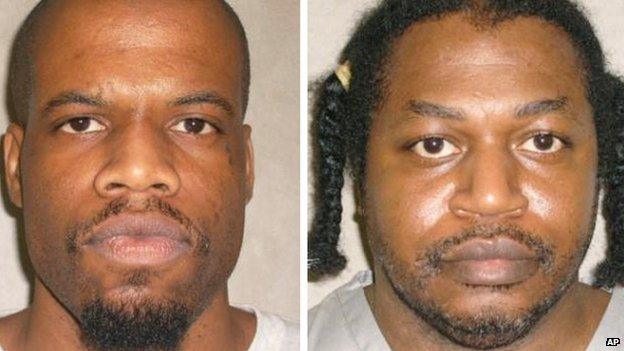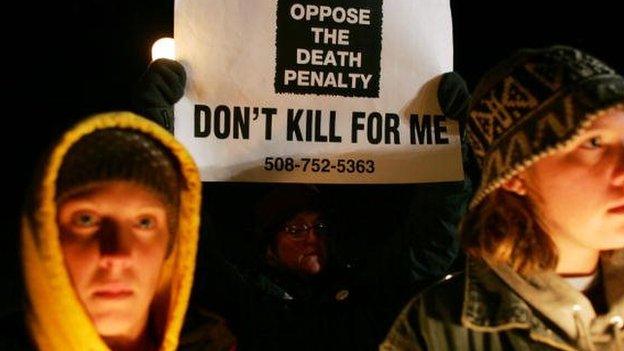An execution that was 'immoral and unconscionable'
- Published
- comments

Charles Warner (right) received a two-week stay following problems executing Clayton D Lockett (left) on Tuesday night
It was, as the National Journal's Dustin Volz put it, external, "a gruesome scene of macabre theatre".
On Tuesday night the state of Oklahoma carried out, external the execution of Clayton D Lockett, who had been convicted of murdering 19-year-old Stephanie Neiman during a botched robbery in 1999.
At the end of the evening, Lockett was dead, so in that regard the execution was a success. But the 43-minute process by which Lockett was put to death has raised significant concerns about the future of capital punishment in the US.
Lockett was supposed to be unconscious when he was given a lethal dose of two drugs. He was not.
He is reported to have writhed on the execution table, attempting to lift his head and speak. He eventually died of a heart attack, but not until after the administering authority had decided to suspend the execution and attempt to revive him. Oklahoma quickly issued a two-week stay for Charles Warner, who was scheduled to be given a lethal injection later the same night.
"What transpired in Oklahoma last night was more than shocking. It was, by most measures, a scandalous turn of events," writes, external MSNBC's Steve Benen. "Regardless of the politics or one's personal opinions about capital punishment, basic decency demands that last night's developments not be repeated."
"I can't read about the Oklahoma execution without shivering a little and retching a lot," tweets, external GQ magazine's Ana Marie Cox.
"The whole point of lethal injection, when it was invented, was to soften the image of capital punishment by making it look like an ordinary medical procedure," writes, external the New Republic's Ben Crair. "But then most medical professionals balked at participating - and so this medical procedure usually fell to people who were less qualified to perform it.
"It is clearer now than ever that lethal injection, as it is practised in this country, is not working as it was supposed to," he says.
The Atlantic magazine's Andrew Cohen writes, external that last night's developments could reframe the death penalty debate:
In killing Clayton Lockett this way, state officials thus elevated a convicted murderer to a status he surely did not deserve in life or would have ever obtained had his execution been preceded by acceptable levels of due process. Lockett was not an innocent man who had been framed by the police, ignored by his attorney, or railroaded by a bigoted judge or jury. If we are to have a death penalty in this country, he was a suitable candidate. But in its zeal to kill him, in its frustration about the delay in meting out punishment, Oklahoma turned him into a symbol.
Lockett, he says, is now a symbol of a dysfunctional Oklahoma state government that wilfully ignored due process. He's become a symbol for the dangers caused by the secrecy around the actual mechanics of executing a convict. And he's become a symbol of a judiciary, "including the United States Supreme Court", that has turned a blind eye to a capital punishment system that has gone horribly wrong.
Lockett deserved to spend his life in prison, writes, external the Philadelphia Daily News's Will Bunch.
"But at the end of it all, there's a reason why we like to call ourselves a civilisation," he says. "Society is supposed to be better than the individuals that we must punish, and so the answer to violence is never pre-meditated state-sponsored violence."
Bunch does not think Lockett's story will lead to a change, however.
"The governor of an American state ordered the torture of a man tonight - that is immoral and unconscionable," he concludes. "Unfortunately, there will be no political consequences, in a state that continues to backslide into Taliban-style barbarism."
Although death penalty critics have dominated the media so far, some supporters have begun speaking up.
Hot Air blog's Allahpundit writes, external:
If you weren't on social media while this was first being reported, you missed a tour de force of bien-pensant moral lecturing from some death-penalty opponents, replete with infographics comparing Iran's hanging of political prisoners and gays with the US's increasingly rare lethal injections of monsters like Lockett.
"I have a hard time getting upset when someone as disgusting as the condemned suffers a bit before expiring," writes, external Sonny Bunch of the Washington Free Beacon. "But as a general matter and a basic principle, I don't think the government should be in the business of intending to make people suffer horrifically before they die."
He says the problem is that states have decided that "bloodlessness is a suitable stand-in for lack of suffering". The issue, he writes, isn't with the death penalty, it's with the attempts to make lethal injections an antiseptic way of executing criminals.
Instead, he writes, we should reinstitute the guillotine.
"It was designed to deliver an efficient, quick, and painless death," he writes. "It performs that task admirably."
The Washington Examiner's Philip Klein targets media coverage of the story, tweeting, external that the New York Times "waits until paragraph 16 to note that executed man shot and buried alive a 19-year-old woman".
Others didn't express much concern about whether Lockett suffered or not.
Conservative activist Bill Hobbs tweets, external: "An execution that ends with the thug dead is NOT a 'botched execution.'"
Responding to the Drudge Report headline "Oklahoma inmate dies after execution botched", conservative commentator Ann Coulter tweets, external: "Isn't that what's supposed to happen?"
If all the US public cares about is that a convicted murderer was put to death last night, then yes, that's what was supposed to happen.
Clayton D Lockett was "supposed to" die. But was he "supposed to" suffer and writhe in pain? And will the US public care about that?
The death penalty may be on its way out. Or perhaps the guillotine is on its way in.
- Published15 February 2014
